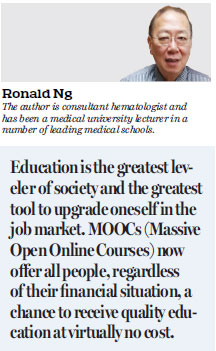MOOCs let us keep pace with rapidly changing world
Updated: 2017-06-16 07:06
By Ronald Ng(HK Edition)
|
|||||||
Use of the internet to promote education has been going on several years but it didn't expand dramatically until 2012 when two professors from Stanford University - Andrew Ng and Daphne Koehler - launched Coursera. Overnight it became an international phenomenon. Last count from the website mooc-list.com shows there are at least 76 Massive Open Online Course (MOOC) providers. The largest, Coursera, offers 1,853 courses followed by edX with 1,053 courses. I started my journey on learning from MOOCs in the same year. To date I have completed more than 100 of them, 93 percent from Coursera, the rest from edX.
It has been forecast that in coming years, most of our working lives will be changed. Gone is the idea of lifelong employment by a single employer. We have to be prepared to change course mid-stream in our careers to meet changing demands for skill sets. All of us need to learn new things in response to changes at work. One of the best ways to achieve that is learning from MOOCs. In my daily work as a doctor, I get to see many young representatives from drug companies. Most are either pharmacology or bio-science graduates, or business/finance graduates. Being a drug representative, they need to know the science behind the drug, and being a salesperson, they need to know the business side of their profession. This is where MOOCs come in handy. There are courses on pharmacology and physiology as well as business and finance. The drug reps can use MOOCs to fill gaps in their knowledge. I know one medical graduate from a university in Myanmar who couldn't obtain a license to practice medicine in Singapore. She became a drug representative instead. Her interest was in clinical trials. I advised her to take an MOOC on clinical trials in Coursera. As a result of that, her company transferred her to the clinical trial division.

The point I am trying to emphasize is that for economies in a state of flux - such as Hong Kong's as it gears up to face the challenges of innovation and technology and the opportunities brought on by China's ambitious Belt and Road Initiative - MOOC courses are the ideal solution in retraining the workforce to meet changing demands in the workplace. But MOOCs are not for work purposes only. They can also fulfil personal interests. It is also worth noting that a number of studies have shown continuing to learn new things can delay, if not outright prevent, the onset of dementia in the elderly. MOOCs will certainly help elderly students pick up new skills and knowledge and promote their mental health to boot. Again, Hong Kong people should take note as the elderly demographic will expand rapidly.
During the financial crisis of 2008 many lost their life savings after they entrusted money to banks and investment houses which sold them risky financial products. Surely that should send a signal to all that we should equip ourselves with some knowledge about how the macro-economics of the world works to minimize investment risks. Once again, MOOCs come to mind.
Over the past two decades the Chinese mainland has emerged as a major player in world politics and economy. That is going to have an impact on all of us in general, and for Hong Kong citizens in particular. There is a danger of bias if one relies on the media alone to learn about the mainland. Academia, with its emphasis on objectivity, is less likely to be biased and there are many excellent courses about the mainland, explaining its political structure and workings. The courses I took run by Professor David Zweig of Hong Kong University of Science and Technology are highly recommended. Before campaigning for "Hong Kong independence", the proponents of such drastic action should gain a wider perspective of politics in general and of politics from a mainland point of view in particular. Had they done so, they might not have embarked on their ill-advised and unrealistic course of action.
Finally, in almost any profession, it pays to stay on the cutting edge by keeping up to date on the latest developments and advances. Again an MOOC is the perfect vehicle to do just that with a minimal investment in time and money.
Registration for MOOC courses is mostly free. You only have to pay about $50 to $80 if you want a certificate. Many universities in the United States look upon an applicant favorably if he or she has completed a course on an MOOC because this requires certain amount of self discipline and tenacity.
Education is the greatest leveler of society and the greatest tool to upgrade oneself in the job market. MOOCs now offer all people, regardless of their financial situation, a chance to receive quality education at virtually no cost. It would be a shame if employees failed to realize their personal potential and interest by not taking advantage of this readily available self-improvement option at practically no cost.
(HK Edition 06/16/2017 page13)